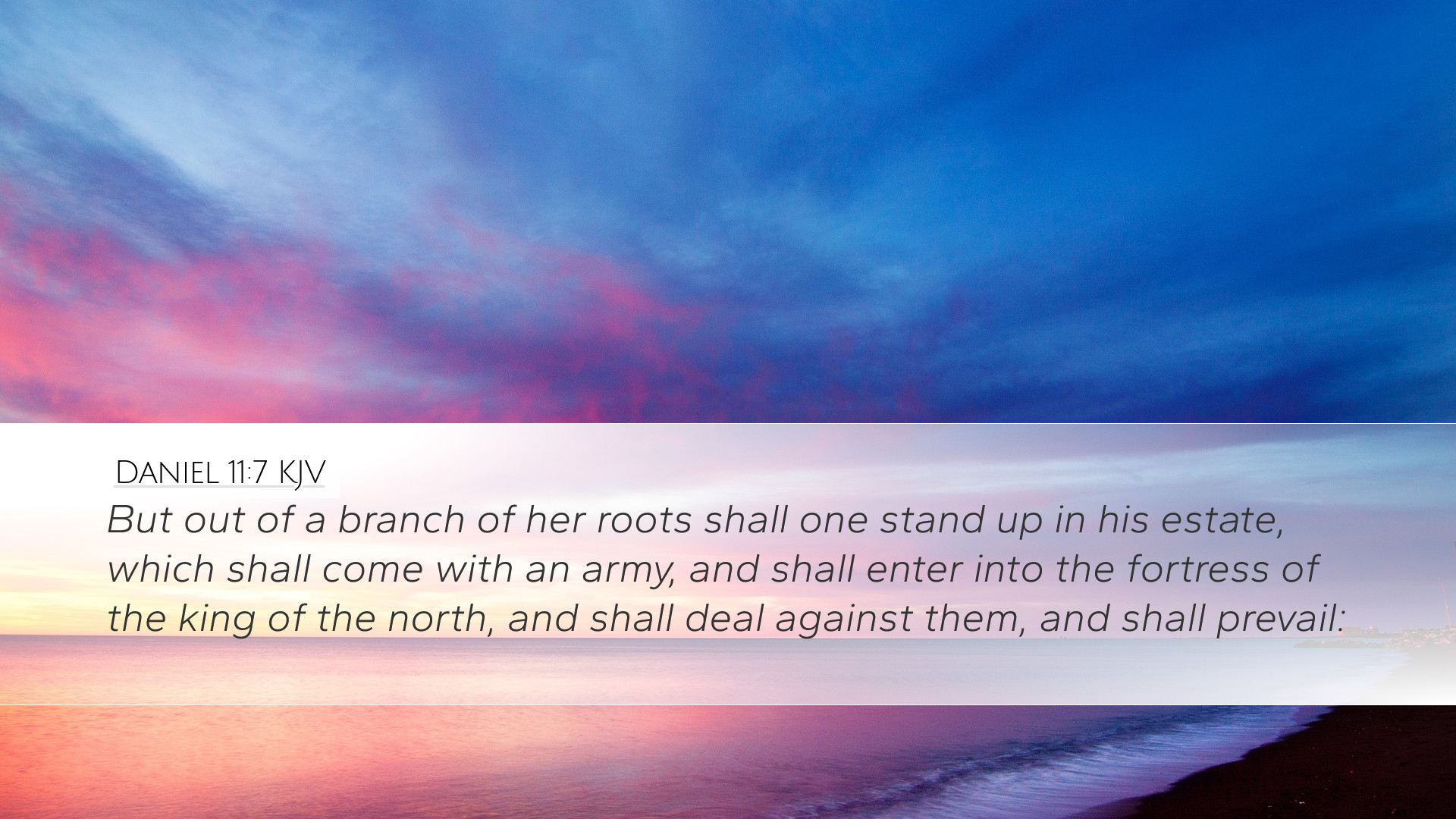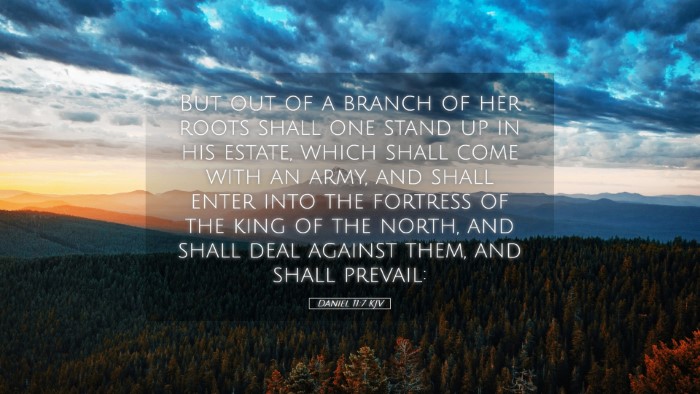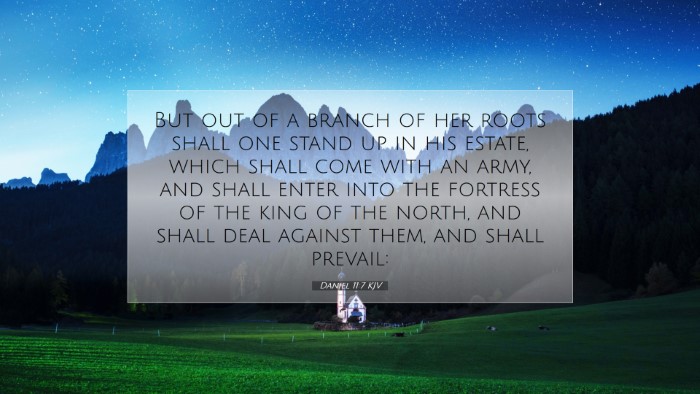Commentary on Daniel 11:7
“But out of a branch of her roots shall one stand up in his estate, which shall come with an army, and shall enter into the fortress of the king of the north, and shall deal against them, and shall prevail.”
This verse from the book of Daniel serves as a pivotal point in the prophetic narrative concerning the conflicts between the northern and southern kingdoms, typically interpreted as the Seleucid and Ptolemaic empires. The density of imagery and prophetic content necessitates a multi-faceted approach to fully grasp its implications.
Historical Context
According to Matthew Henry, the backdrop of this passage is rooted in the historical struggles that characterized the Hellenistic period following the conquests of Alexander the Great. The “king of the north” generally represents the Seleucid dynasty based in Syria, while the “king of the south” refers to the Ptolemaic dynasty of Egypt. The battles between these two powers significantly affected the Jewish people and their land.
Albert Barnes provides insight into the political dynamics at play, emphasizing the succession of power through various leaders and their impacts on Israel. The “branch of her roots” metaphorically points to a descendant from within the southern kingdom (Judah or Israel) who would rise against this oppressive force.
The “Branch” and its Significance
Adam Clarke elaborates on the figure described as the “branch.” This term has rich theological significance, often signifying a messianic figure or a leader raised up by God. This leader is perceived to come from humble beginnings but is called to thwart the plans of his adversaries, echoing the larger biblical theme of divine deliverance through unexpected channels.
The concept of standing “in his estate” suggests legitimacy and authority, reinforcing Clarke’s notion that this figure possesses rightful leadership, especially in the context of ongoing strife.
The Military Aspect
The military undertones in the latter part of the verse indicate progression from conflict to resolution. The term “shall come with an army” is indicative of preparations for a significant campaign against the formidable forces of the king of the north. Henry elucidates that this prophecy portrays not just a physical battle but also serves to illustrate the spiritual warfare being waged throughout the ages.
The “fortress of the king of the north” symbolizes the strongholds of power that stand against God’s people, demonstrating a recurring biblical theme of divine intervention in the face of tyranny. Barnes highlights that this ongoing battle between good and evil is not merely historical but relevant across epochs, emphasizing that God’s hand directs the affairs of nations.
Prevailing Against Adversity
“Shall deal against them, and shall prevail” encapsulates the climax of the conflict: victory. This assertion is vital for understanding the overarching message of the passage. Clarke points out that the assured victory denotes God’s sovereignty over historical occurrences. The faithfulness of God is a recurring theme throughout the Book of Daniel, encouraging believers that no matter the dire circumstances, divine authority prevails.
Henry draws particular attention to the fact that while the rise of this “branch” may appear unlikely, it serves as a reminder of God’s capability to deliver His people from injustice and oppression, even through the most unexpected leaders. This aspect should incite hope and perseverance among believers, as it emphasizes that their efforts in the face of adversity may lead to ultimate triumph.
Theological Reflections
In theological reflection, this verse can also be seen as a foreshadowing of Christ, the ultimate “Branch” who arose from the lineage of David. The New Testament writers echo these sentiments, expressing the belief that Jesus fulfills the promises made to Israel and transcends mere historical events to offer a spiritual victory over sin and death.
Moreover, this passage embodies the idea that God raises leaders to accomplish His purposes, a principle that remains pertinent today. It implores pastors and theologians to recognize the hand of God in current events, reminding them of their calling to remain steadfast and vigilant as agents of His will amidst a world rife with tumult.
Contemporary Applications
- Faith in God's Sovereignty: Understanding that God directs the affairs of nations and individuals, encouraging believers to trust in His ultimate plan.
- Role of Leadership: The idea that God raises leaders from within the community offers a powerful message about the importance of responding to God’s call to leadership, regardless of circumstances.
- Hope in Conflict: This passage serves as an anchor for believers facing challenges, affirming that divine victory is assured despite present difficulties.
Conclusion
Daniel 11:7 illustrates a crucial turning point in biblical history, marked by divine orchestration and prophetic foresight. By standing on this assurance, both historical interpreters and contemporary believers can glean the vital truths about God's unyielding commitment to His people and His ultimate plan for redemption.
As this verse resonates through the ages, it remains a testament to the enduring nature of God's promises and the powerful call to rise against the adversities that seek to undermine faith. May this insight encourage believers, scholars, and pastors alike as they study and interpret divine truths, affirming the relevance of Scripture to both historical and present contexts.


